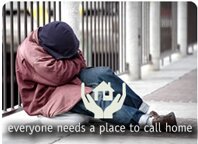Political Action Kit
The Greater Vancouver Regional Steering Committee on Homelessness
Political Action Kit
A tool kit for citizens and homeless support groups seeking to influence political action on affordable housing in Metro Vancouver.
Introduction from the Co-Chairs
The RSCH comprises representatives from over 40 service providers, community-based organizations, and all levels of government with the singular objective to work to end homelessness in the Metro Vancouver region.
Formed in 2000, the RSCH developed and now oversees the implementation of the Regional Homelessness Plan for Greater Vancouver, Three Ways to Home. The Plan reflects the three components of a comprehensive solution to homelessness — affordable housing, support services, and adequate income. Through recent community consultations, the RSCH has identified supportive housing, outreach services, mental health and addiction, prevention services, emergency services and facilities, and improvements to service delivery as its priorities for the immediate future.
The RSCH has developed this Political Action Kit to help raise the profile of not only these priorities, but also other issues affecting homeless people in Metro Vancouver. The Kit is also designed to assist individuals and local homeless support groups in engaging our political representatives in meaningful discussions during the course of our democratic processes.
The Kit examines some of the key homelessness issues in the region, community-inspired solutions, known positions of the provincial and federal political parties that are active in BC, and questions that you may ask candidates and parties during elections campaigns.
Individuals and organizations are encouraged to use the Kit to guide their contacts with candidates and political parties before, during and after election campaigns. Candidates are also encouraged to send written responses to the questions in the Kit, with the expectation that their responses will be shared with the membership of the RSCH.
How to use this kit
This Kit is not designed to tell you how to vote, as it is not the role of the RSCH or its membership to instruct people or groups which politician or political party they should support. Each person must make up his or her own mind, taking into account all the issues that concern him or her.
Private individuals
Private citizens, can use the material in the Kit to educate themselves about homelessness and vote for a candidate or party that best represents their views or values. They can also use the information to help formulate questions for the parties or candidates, or raise the sample questions in the Kit directly with them. Finally, individuals can use the material to inform themselves when participating in group discussions.
Community groups
Community groups, such as faith organizations and homeless support groups may also use the Kit for discussion purposes, or to educate the membership about homelessness before engaging candidates and their parties in discussion.
Homelessness issues and action plan
Homelessness is a complex problem that defies either a single cause or solution. However, the issues that homeless people everywhere face are consistent, which suggests that tackling those issues should be part and parcel of any resolute plan to end homelessness.
Broadly speaking, the homeless are confronted with three classes of issues — structural inequities, breakdown of family and social networks and social exclusion/discrimination.
Structural Inequalities
Structural inequalities are the disparities in society that constantly favour some groups over others. When it comes to homelessness, these structural inequities revolve around a number of significant socio-economic barriers, including:
———————————————–
Enquiries on the Kit may be directed to:
Judy Roberts
Greater Vancouver Regional Steering Committee on Homelessness
[email protected]
Alice Sundberg Susan Papadionissiou
Co-chair, Regional Steering Co-chair, Regional Steering
Committee on Homelessness Committee on Homelessness



